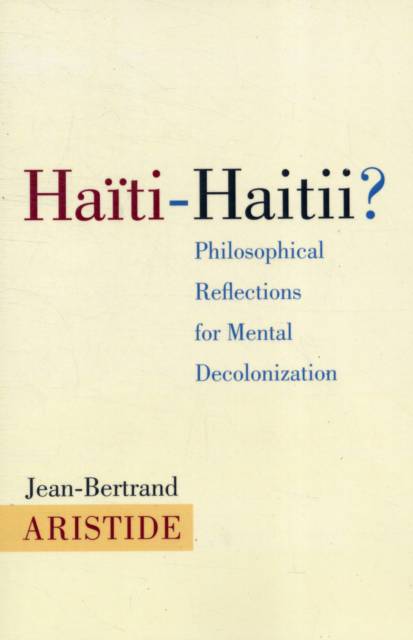
- Afhalen na 1 uur in een winkel met voorraad
- Gratis thuislevering in België vanaf € 30
- Ruim aanbod met 7 miljoen producten
- Afhalen na 1 uur in een winkel met voorraad
- Gratis thuislevering in België vanaf € 30
- Ruim aanbod met 7 miljoen producten
Zoeken
Haiti-Haitii
Philosophical Reflections for Mental Decolonization
Jean-Bertrand Aristide
Paperback | Engels
€ 74,95
+ 149 punten
Uitvoering
Omschrijving
In Haiti - Haitii Jean-Bertrand Aristide combines the artistry of Swahili with the poetic incisiveness of his native Kreyol to produce an eloquent critique of colonialism and an affirmation of humanist principles. Aristide uses poetry, prose and proverbs to tell the epic story of Haiti, the world's first independent Black republic. He chronicles the brutality of the colonisers and the ways in which they attempted to dehumanise Haitians. Aristide illustrates how Haitians' 300-year journey to freedom has been guided by the African philosophy of Ubuntu, a world view that emphasises human solidarity. Today, Aristide writes, it is this same philosophy that can empower a new generation of Africans to resist neo-colonialism. This book is the inspiring inside story of the country which has both suffered in unimaginable ways and dared to dream of freedom. It will be essential reading for all those interested in the past, present and future of Haiti and the prospects for national liberation across the world in the 21st century.
Specificaties
Betrokkenen
- Auteur(s):
- Uitgeverij:
Inhoud
- Aantal bladzijden:
- 100
- Taal:
- Engels
Eigenschappen
- Productcode (EAN):
- 9781612050546
- Verschijningsdatum:
- 30/11/2011
- Uitvoering:
- Paperback
- Formaat:
- Trade paperback (VS)
- Afmetingen:
- 142 mm x 216 mm
- Gewicht:
- 140 g

Alleen bij Standaard Boekhandel
+ 149 punten op je klantenkaart van Standaard Boekhandel
Beoordelingen
We publiceren alleen reviews die voldoen aan de voorwaarden voor reviews. Bekijk onze voorwaarden voor reviews.











